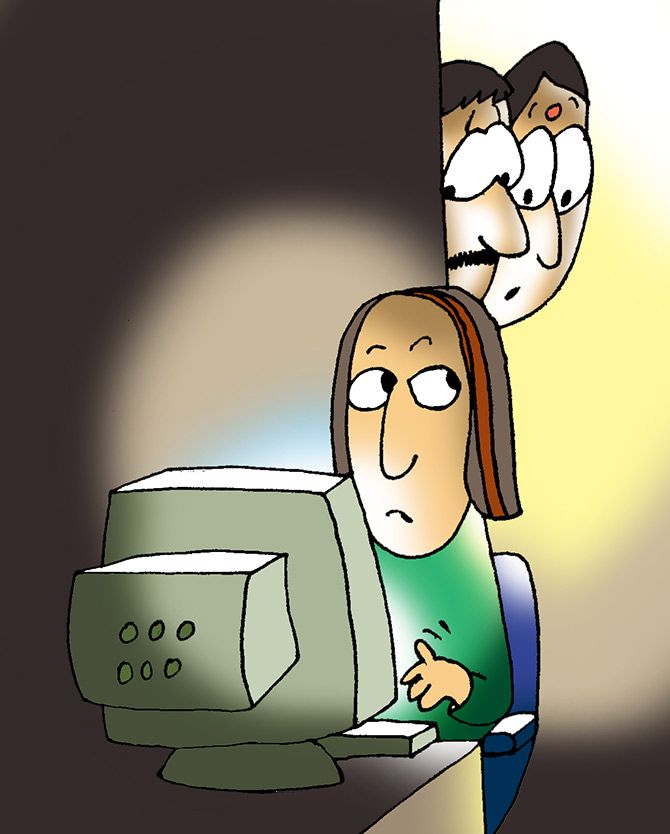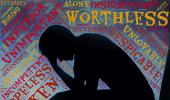As the Blue Whale Challenge claims its first victim in Tamil Nadu, psychiatrist Dr Anjali Chhabria tells you what you can do to stop it from claiming lives.
Illustration: Uttam Ghosh/Rediff.com

The Blue Whale Challenge, originating from Russia, has now pervaded the Internet and is making its way around the world.
The challenge was created by Philipp Budeikin, a 22-year-old man, in 2013.
The creator has since been arrested and sentenced to jail for three years for the attempt at inciting Russian youth to commit suicide.
The challenge started with Budeikin making online contact with impressionable teenagers, who he thought were weak enough to manipulate.
He assigned them 50 tasks, ultimately leading them to committing suicide.
These tasks vary from seemingly harmless activities like watching scary videos at 4.20 am, to self harm like carving the picture of a blue whale on your body, etc.
The last task of the Blue Whale Challenge is to jump off the terrace of a building to your own death.
The game is administered by online administrators who call themselves 'curators' and assign tasks to individuals whom they've chosen and reached out to through social media.
Each task is required to be documented in the form of pictures or videos as form of evidence for the curators.
India woke up to the dangers of the Blue Whale Challenge after suspicion that it had led to a 14 year old's suicide in Mumbai. It was later revealed that the teenager's tragic death was not related to the Blue Whale Challenge, but the dangers of it have been driven home.
What children can access and are accessing on the Internet is predominantly unfiltered and neglected, which has lead to them being exposed to harmful content and people.
While Indian lawmakers have mistakenly called for a ban on the Blue Whale Challenge -- it can't be 'banned' because it is not a game that can be downloaded on a phone or a Web site and there is no application or specific Web site for the challenge -- here's what you can actually do to stop it from claiming any more lives.
Parents, it's time to wake up!
- Look out for your children.
- Be vigilant about what they are exposed to.
- Most of all be there for their children and provide emotional support.
Not only are teenagers susceptible to being influenced easily, they also don't know better, and that's why they need us.
This game brings to light that there are many who are already disturbed and need help, but due to lack of it or otherwise may find themselves indulging in self harm, or participating in a game like this.
Most children/teenagers don't have the faculty to reason with themselves and can be easily sucked in to this pattern of manipulation.
Social media has played a notorious role in making such information and interaction possible.
It is unfortunate that the realisation and knowledge of this game has surfaced only after it has already driven several people across the world to commit suicide.
The Internet is full of information -- true and false, appropriate and inappropriate, and it is necessary that there is a process of surveillance and filtration in place to determine the distribution of information and its audiences.
In the age of complete access, parental control needs a comeback.
We may think that things like this occur behind our backs or in complete secrecy, when in fact they occur right under our nose and are often avoidable.
The Blue Whale challenge has its own hash tag on Twitter, where users are asking curators to find them and give them tasks.
Things like these can be easily detected and can help understand or at least alert parents and other individuals that there is cause for worry, and reason to be wary.
Although the Blue Whale challenge portrays itself as a game, and provides the illusion of 'choice' to the players, it is simply a facade, because its main goal is to manipulate and torment individuals that are not mentally equipped to protect themselves from it which essentially qualifies as 'cyber bullying'.
'Death is Not the Answer' (DINTA) brings to light that 81 per cent of Indians are now online, 22 per cent of which have experienced cyber bullying.
Research shows strong evidence that bullying leads to suicidal thoughts.
There are times when there is an abundance of tell tale signs that let you know that someone needs help or is troubled, at times it is obvious, however, a lot of the times these signs are not at the surface, which is why we need to observe more closely the behaviour of our loved ones, and maintain our connection with them.
The children's behaviour on the Internet and otherwise can often give us a good idea about how they are feeling, and thinking about certain things.
Keep a watch out for these signs:
- Gradual decline in social interactions, participating in otherwise pleasurable activities.
- Being angry and irritable.
- Keeping things to themselves and not wanting in open up to anyone.
- In young adults, anger is usually used as a defence in order to protect their actual emotions.
- Their conversations may revolve around being pessimistic or dejected with life.
In order to seek immediate help, contact the closest mental health clinics or hospitals.
Mindtemple in Mumbai (Phone: 022-26289792) provides immediate interventions to those who are highly suicidal or have had suicidal thoughts










